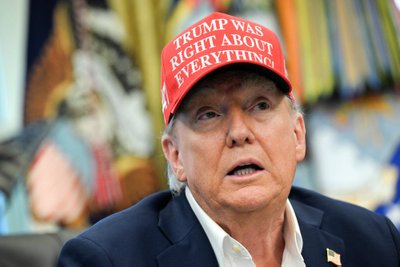According to The Guardian, US law “gives the president broad powers to take various actions in response to a declared national emergency, but none of these actions expressly include the authority to impose tariffs, duties or the like, or the authority to impose taxes,” the court ruling states.
It also adds that many of Trump's tough tariffs"are unlimited in scope, size, and duration" and "assert expansive powers that go beyond the clear limitations" his administration has relied on.
The ruling is the biggest blow to Trump's tariff policies and will likely mean the Supreme Court will have to decide whether he, as president, has the legal authority to change U.S. trade policy. The court said the ruling will not take effect until Oct. 14, meaning the court has allowed the tariffs to remain in place until then, Reuters reports.
“ALL TARIFFS STILL IN PLACE!” Trump wrote on social media moments after the decision was announced, as stock markets closed for a three-day weekend in the United States. In the lengthy message, he accused the appeals court of political bias.
“If this decision were allowed to stand, it would simply destroy the United States of America,” the president continued. “As we begin this Labor Day weekend, we should all remember that TARIFFS are the best way to help our workers and support the companies that make great products made in AMERICA.”
Diplomatic embarrassment
The decision repeals Trump's"Liberation Day" tariffs, which imposed a 10 percent base tariff on almost all US trading partners, and his so-called"retaliatory" tariffs on countries he says have treated the US unfairly, The Guardian reports.
Trump has claimed the authority to impose tariffs on trading partners under the International Emergency Economic Powers Act (IEEPA), which gives the president the power to regulate or ban international transactions during a national emergency under certain circumstances. The Trump administration has cited a variety of national emergencies as reasons for the action, including the US's trade deficit with trading partners, the fentanyl trade and immigration.

But a small business group challenged the administration’s arguments, saying they “undermine small businesses across the country.” On Friday, the appeals court ruled: “It seems unlikely that Congress, in enacting IEEPA, intended to depart from its previous practice and grant the President unlimited authority to impose tariffs.”
The decision also states that US law “does not mention tariffs (or any of their synonyms) and does not contain procedural safeguards that would place clear limits on the President’s authority to impose tariffs.”
Earlier on Friday, Bloomberg reported that the administration, concerned that a court could immediately invalidate the tariffs, issued statements from Treasury Secretary Scott Bessent, Commerce Secretary Howard Lutnick and Secretary of State Marco Rubio warning that such a move would be a"dangerous diplomatic embarrassment" for the United States.
Reuters recalls that during his second term, Trump made tariffs a pillar of US foreign policy, using them to exert political pressure and renegotiate trade agreements with countries that export goods to America. Tariffs have given the Trump administration leverage to demand economic concessions from trading partners, but they have also increased instability in financial markets.

